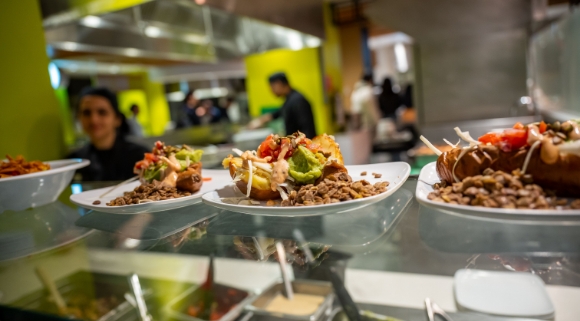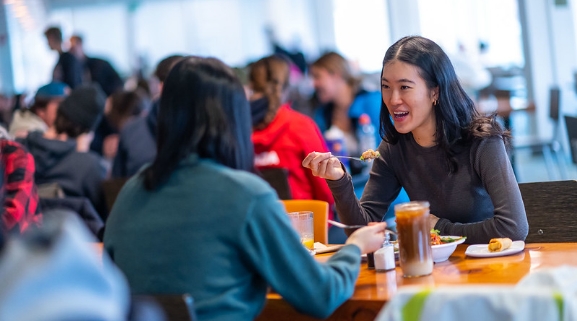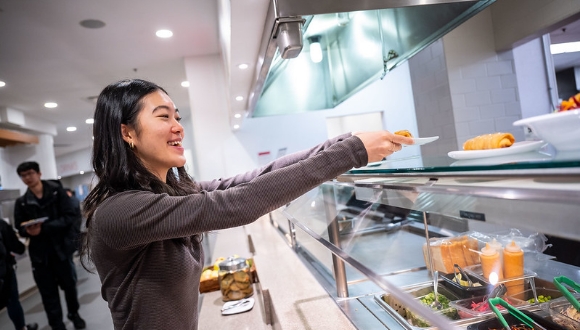FOOD AND NUTRITION

Food & Nutrition
Food is a complex issue including the food environment on campus, the broader food system in the Okanagan, and food security. Having adequate, secure access to food supports wellbeing. Previous Voice research has been used to influence new food contracts, ensure available drinking water in every building on campus has appropriate signage indicating the water has been treated, and most recently, the opening a one-of-a-kind Community Wellness Hub in Picnic with a variety of food programs to build food skills and literacy amongst university students.
The food programming PICNIC are funded by the generous financial contributions of the Student Union of UBC, funding support through the UBC Affordability Task Force, and grants.
Programs
1. Food Skills Workshop

Wednesdays & Thursdays | 5:00-6:30pm | Picnic (UNC 122B)
September – April
*Registration Required
Peer-led food skills workshops to foster food skills and community. Learn basic meal-prepping skills, food budgeting skills, how to build a balanced meal, and more! Participants will have their own station with ingredients provided while the facilitator leads everyone through the recipe. Afterward, everyone eats together and discusses a topic. New recipe every week! All skill levels are welcome. Bring a container in case there are leftovers!
*Note: this is a high demand program; if you register and then realize you won’t be able to attend, please cancel your order to allow people on the waitlist to join. If you register and don’t show up by 5:10pm, your spot may be given to someone else.
Upcoming workshops (click link to register):
Note: Registration goes live for the upcoming week Mondays around 9am. The link will not work before then.
January 8th & 9th: Burrito Bowls
- Vegetarian; contains dairy
January 15th & 16th: Peruvian Causa
- Contains tuna, egg
January 22 & 23: Enchilada Power Bowl
- Vegetarian; contains soy, almond butter
January 29th & 30th: Pesto Pasta
- Contains gluten, dairy
February 5th & 6th: Shepherd’s Pie
- Contains beef (halal), dairy
February 12th & 13th: Mushroom Risotto
- Vegetarian; contains dairy
February 26th & 27th: Red Thai Curry
- Vegetarian; contains soy
March 5th & 6th: Kimchi Sundubu Jigae (Soft Tofu Stew)
- Vegetarian; contains sesame, soy
March 12th & 13th: Vegetarian Mushroom Burgers
- Contains dairy (optional)
March 19th & 20th: Sweet Crepes
- Contains eggs, gluten, dairy, hazelnut spread (optional)
March 26th & 27th: Skillet lasagna
- Vegetarian; contains gluten, dairy
FAQ’s
Q: Do I have to register for a workshop? What if it is sold out?
Registration guarantees your spot at the workshop, as long as you show up by 5:10pm. If the workshop is sold out, you are welcome to drop by Picnic and see if there are any last minute spots available.
Q: What if I have dietary restrictions or preferences?
A: Most of our recipes are vegetarian, with occasional exceptions. We do our best to accommodate dietary preferences, such as dairy and gluten-free. Allergens will be noted beside each recipe. Picnic is not an allergen-free facility and we cannot guarantee the food has not been cross-contaminated with other allergens.
Q: I have class during the workshop, is there any way to still participate?
A: Workshops are offered at two different times each week. The recipe will be posted on our website before each workshop so you can prepare the meal at home.
Q: Does it cost anything to participate?
A: Nope, workshops are free for UBCO students!
2. Breakfast Program

Drop-In | Monday – Friday | 8:30-10:30am | Picnic (UNC 122B)
September – April
Eating breakfast can support wellbeing. Eating enough and regularly throughout the day can support mood, cognitive ability, and concentration – fueling a busy day of classes or studying. Grab and go items are available (for free!) in Picnic Mondays 9:00-10:30am and Tuesday to Friday from 8:30-10:30am. Nondairy options are available.
Here’s an idea of the kinds of items to expect; milk and chocolate milk, non-dairy milk, Greek yogurt, coconut yogurt (dairy free), cheese portions, fresh fruit, granola bars, almonds.

3. Community Meal
Drop-In | Tuesdays | 12:00-1:30pm (or until the food runs out, whichever comes first!) | Picnic (UNC 122B)
September – April
Build community, share culture, and enjoy a free, nourishing meal. A large batch of primarily plant-based meals will be prepared and served by Picnic and partners. Meals are free and open to all members of the UBCO community. Meals are served every Tuesday starting at noon and ending at 1:30pm, or when the food runs out – whichever comes first! Participants are required to bring their own clean container to take their food with them, in an effort to reduce waste.
Upcoming Community Meals
- January 14: Matzo Ball Soup
- January 21: Butter Bean Shakshouka
- January 28: Refried Bean Enchiladas
- February 4: Lentil Sloppy Joes
- February 11: Borscht
- February 25: Soy-Glazed Eggplant and Tofu Donburi
- March 4: Mediterranean Falafel Bowl
- March 11: BBQ Bowl
- March 18: Mix n’ Match Meal Prep
- March 25: Mix n’ Match Meal Prep
- April 1: Mix n’ Match Meal Prep
- April 8: Mix n’ Match Meal Prep

4. Community Market
Every other Tuesday| 9:30am-1:30pm | The Court Yard (Or inside EME if the weather is bad)
September – April
Welcome to the University of British Columbia Okanagan’s Community Market!
Discover local and sustainable businesses at our Community Market. Located outside UNC/EME (weather dependent), the market connects the University with the greater community. By showcasing the best products from local farms and artisans, the market is a great shopping experience and strengthens the ties between the university and the surrounding neighbourhoods. The Community Market also provides an opportunity for students, staff, and faculty to showcase a project, initiative, club, and more to the campus community.
Do you have a question, suggestion, or want to become a vendor or promote a campus initiative at the UBCO Community Market? We’d love to hear from you! Send us an email at ubcocommunity.market@ubc.ca
Community Market dates for the 2024-2025
- September 24 (outdoor)
- October 8 (outdoor)
- October 22 (outdoor)
- November 5 (outdoor; indoor if inclement weather)
- November 19 (indoor)
- December 3 (indoor)
- January 14 (indoor)
- January 28 (indoor)
- February 11 (indoor)
- February 25 (indoor)
- March 11 (outdoor; indoor if inclement weather)
- March 25 (outdoor)
- April 8 (outdoor)

5. Dietitian Drop In
Thursdays | 2:30-3:30pm | Picnic (UNC 122B)
September – April
Are you curious about how to fuel your body while balancing school, work, and life? Got questions about healthy eating, special diets, or allergies? Whether you’re wondering about intuitive eating, meal planning, or navigating campus dining, our dietitian is here to help! No appointments needed, just drop in and chat! Join our Dietitian Drop-In for a casual Q&A session with a registered dietitian.
Information and Resources

Okanagan Food Map
We have collaborated with students to create this Food Map for UBCO Students. It helps you locate:
- Emergency food sources
- Grocery Stores
- Farm and Fruit Stands
- International Food Stores
- International Restaurants
- Places to find Kosher or Halal products
- Places to find dietary requirements (i.e. Gluten Free)
- Places where you may use Campus Flex dollars (for meal plan holders)
- Places that offer student discounts and free birthday stuff.
Contact us if you would like us to add to or update the map.
Dietitian Services Phone Line – 811
8-1-1 is a free-of-charge provincial health information and advice phone line available in British Columbia. The 8-1-1 phone line is operated by HealthLink BC, which is part of the Ministry of Health. By calling 8-1-1, you can speak to a health service navigator, who can help you find health information and services; or connect you directly with a registered nurse, a registered dietitian, a qualified exercise professional, or a pharmacist. Any one of these healthcare professionals will help you get the information you need to manage your health concerns, or those of your family.
HealthLink BC – Food and Nutrition Info
HealthLink BC provides free, evidence-based, and up-to-date health information. The Food and Nutrition page offers a variety of helpful information about:
- Reading and understanding food labels
- Food and water safety
- Nutrient-specific information
- Planning, shopping, and preparing food
- Food and nutrition information for specific health conditions, life stages, and eating preferences
How We Got Here

January 2023 – Grand Opening of Physical Food Hub at UBCO
We brought together UBC Okanagan executives with our Student Union Leadership to have a cooking contest to showcase some of the values we are trying to demonstrate through Picnic – cooking skills, nourishing food, and community.
May 2021 – Launching Partnerships for a Physical Food Hub at UBCO
Wellbeing Scholar, Sarah Clement and Casey Hamilton, Campus Wellness Specialist, teamed up to continue their work to address the high rates of student food insecurity at UBCO. Building on their previous work, in this phase they focused on establishing partnerships to support the development of a physical food hub and explored opportunities for physical food hub pilot projects including a campus farmers’ market, a campus food production initiative (e.g., community garden or market garden), a food rescue program, and a campus-wide dialogue program focused on implementing climate-friendly food systems. Their vision for a physical food hub includes a physical space on campus that is supported by an interlocking network of projects, departments, individuals, and partners that enable student and community food security as well as food systems transformation.
August 2020 – Envisioning a Physical Food Hub at UBCO
UBC Wellbeing Scholar, Sarah Clement, and the Campus Wellness Voice team conducted the first phase of the Physical Food Hub at UBCO project. Phase 1 was completed between May – August 2020 and included the following:
- A literature review about food hubs, student food security, food security and climate change, and placemaking,
- An environmental scan of 25 food security initiatives and food hub spaces at post-secondary institutions and in communities across Canada and held 13 interviews with food security leaders at post-secondary institutions and national food security organizations,
- 23 community consultation sessions with 109 UBC Okanagan campus community members to develop a vision for a physical food hub at UBC Okanagan.
We heard unanimously that a physical food hub is important for supporting food security at our campus and that we must work towards its development. Recommendations moving forward include:
1. The formation of a multi-stakeholder committee for the planning and development of a physical food hub at UBCO. The committee is to include students, staff, and faculty.
2. We suggest that the first priority of this committee is to determine the high-level governance structure of the physical food hub. Multiple consultation sessions have revealed that the Physical Food Hub may be best housed within the Associate Vice President Students portfolio with appropriate staffing. The consultation process also revealed that staffing is essential. Physical space and funding are the next priorities after governance.
3. The university administration and planning departments must prioritize the physical food hub in development and construction on campus; the construction of new buildings on campus and/or renovations of existing buildings. The university administration must also prioritize allocating outdoor space for the outdoor component of the food hub.
April 2017 - Voice Uncovers Student Food Insecurity
The Campus Wellness Voice team led by Casey Hamilton, Campus Wellness Specialist, analyzed data collected on the UBCO campus to describe student food insecurity. The team found that 42% of undergraduate students participating in the survey reported food insecurity. These findings point to the risk for food insecurity among students who are already vulnerable to socio-economic inequity due to belonging to marginalized groups. The findings were published in the Canadian Journal of Higher Education.